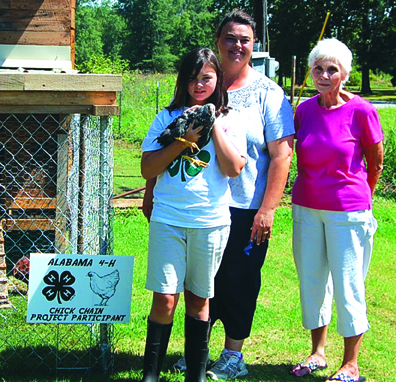By Tamara Tellis/Staff Writer
There comes a time in a child’s life where he/she needs to learn about responsibility.
The best way to teach him/her is by giving them something to be responsible for.
The Alabama Cooperative Extension System gives children the opportunity to learn about responsibility all while being resourceful.
The organization’s chick-raising program provides participating children 24 chicks to raise and take care of for at least four months.
“This is the first time it has ever been done in Etowah County,” said County Extension Coordinator of Etowah County 4-H and Youth Development Amy Burgess. “It was piloted in Dekalb and Marshall counties three years ago. We actually went up to Tennessee and saw their program and then came back and started it here in Alabama. We started with three counties and now, in the state, there are eight counties with Etowah County being one of them.”
Participants pay $50 and 24 one-day-old chicks are shipped to them from Texas. They go through training before receiving the chicks to gain information on how to care for their chicks. 39 kids in Etowah County participate in the program.
“We gave them five breeds that they could choose from and they could choose three of the five breeds,” said Burgess. “So they got eight of each of the three breeds. All of the chicks come from a hatchery in Texas and came through the post office. They all come from the same hatchery and the same age so that every child is on a level playing field once they start. They took the 24 chicks home and had to breed them and start feeding them. They will keep them for, roughly, 20 weeks and then at the end of September they will bring five of one breed to the county show and auction.”
At the county show, the kids will be judged on how well they grew and maintained their chickens. Those five chosen chickens will then be auctioned off.
“The kids will get the bulk of those auction proceeds and they get to keep the 19 that are at home to create their flock,” said Burgess. “That is why it is called a chain because it perpetuates itself. At the end of those 20 weeks, they should probably be ready to lay eggs. The 19 that are at home will go into egg production, so they can start selling farm fresh eggs later this fall.”
After only two months of chick raising, one participant loves her new responsibilities, which she refers to as her “babies.”
“My grandfather has chickens on his farm and he has a lot of fun with his chickens and so I thought ‘maybe I would want to get some chickens of my own,’ said chick raiser Sarah Oden. “So I got some chickens and at first I was a little bit frightened by them and I thought that they would be pets, [but] they are clearly not pet material. They are more here for your food and [care].”
“She loves it,’ said Sarah’s mother Sonja Oden. “[Sarah] is very active in the Etowah County 4-H club and this was a project that they offered for the first time in Etowah County this year, so she wanted to participate. She had never done anything like this before. She decided she wanted to do this for the first time and do the livestock, so I said ok. We started with 24 birds, and within a couple of days two of them passed away, so we have a total of 22 birds right now. Silver Laced Wyandotte, Ameraucana and Rhode Island Red are the different breeds that we have.
Sarah has named all 22 of her birds and tends to them all very carefully. The chickens are kept in a coop that she helped build, which Sonja refers to as the “Buk Mahal,” with the wood from her grandmother’s old shed.
“They learn responsibility,” said Burgess. “They learn how to take care of something other then themselves. They learn time management, financial management, and chick production practices. They learn about the food chain, and how you have to put good, quality nutrition into something in order to produce something good. One thing that people enjoy about it is that they get to spend time with an adult that will be helping them with it.”
The county show and auction is set for Sept. 29. For more information about the chick raising program contact Alabama Cooperative Extension System office at 256-547-7936





